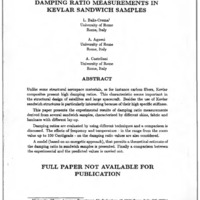Damping Ratio Measurements In Kevlar Sandwich Samples
Item
- Title
- Damping Ratio Measurements In Kevlar Sandwich Samples
- Report Number
- WL-TR-91-3078 Volume III, p. IBD-1
- Creator
- Balis-Crema, L.
- Agneni, A.
- Castellani, A.
- Corporate Author
- University of Rome
- Date Issued
- 1991
- Date Modified
- 1991-08
- Extent
- 1
- Identifier
- ADA241313
- Format
- 1 online resource
- Abstract
-
Unlike some structural aerospace materials, as for instance carbon fibers, Kevlar
composites present high damping ratios. This characteristic seems important in
the structural design of satellites and large spacecraft. Besides the use of Kevlar
sandwich structures is particularly interesting because of their high specific stiffness.
This paper presents the experimental results of damping ratio measurements
derived from several sandwich samples, characterized by different skins, fabric and
laminate with different lay-up.
Damping ratios are evaluated by using different techniques and a comparison is
discussed. The effects of frequency and temperature - in the range from the room
value up to 100 Centigrade - on the damping ratio values are also considered.
A model (based on an energetic approach), that permits a theoretical estimate of
the damping ratio in sandwich samples is presented. Finally a comparison between
the experimental and the predicted values is carried out.
FULL PAPER NOT AVAILABLE FOR
PUBLICATION - Description
-
Unlike some structural aerospace materials, as for instance carbon fibers, Kevlar
composites present high damping ratios. This characteristic seems important in
the structural design of satellites and large spacecraft. Besides the use of Kevlar
sandwich structures is particularly interesting because of their high specific stiffness.
This paper presents the experimental results of damping ratio measurements
derived from several sandwich samples, characterized by different skins, fabric and
laminate with different lay-up.
Damping ratios are evaluated by using different techniques and a comparison is
discussed. The effects of frequency and temperature - in the range from the room
value up to 100 Centigrade - on the damping ratio values are also considered.
A model (based on an energetic approach), that permits a theoretical estimate of
the damping ratio in sandwich samples is presented. Finally a comparison between
the experimental and the predicted values is carried out.
FULL PAPER NOT AVAILABLE FOR
PUBLICATION - Distribution Classification
- 1
- Distribution Conflict
- No
- DTIC Record Exists
- No
- Illinois Tech Related
- No
- Photo Quality
- Not Needed
- Report Availability
- Full text available
- Type
- article
- Media
 articleIBD
articleIBD
Linked resources
Warning: Undefined array key "id_concat" in /var/www/html/omeka-s/themes/foundation/view/common/linked-resources.phtml on line 40
Warning: Undefined array key "property_alternate_label" in /var/www/html/omeka-s/themes/foundation/view/common/linked-resources.phtml on line 41
Warning: Undefined array key "property_label" in /var/www/html/omeka-s/themes/foundation/view/common/linked-resources.phtml on line 43
| Title | Class |
|---|---|
| Proceedings of Damping '91: 13-15 February 1991 San Diego, California (GCA-1 through JCB-17) |